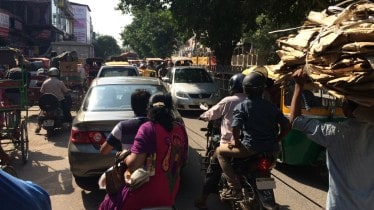The increased demand for private car ownership, accelerated by a growing middle class and safety concerns during Covid-19, poses a challenge to India’s sustainable mobility future says a ‘Future of Cities & Shared Mobility India’ report launched by Uber.
The study analysed transportation trends in urban India and recommends changes required for a sustainable future. It was commissioned by Uber, and compiled by WXY Studio, a New York-based organisation specialising in urban design and planning, the report’s findings and recommendations focus on the need to support shared mobility, move people more efficiently and affordably, and curb the country’s growing demand for private car ownership.
The report was presented in the national capital to Union Minister of Housing and Urban Affairs, Hardeep Puri, by the Uber India & South Asia – President, Prabhjeet Singh.
The study finds that India has an opportunity to leapfrog to an era of auto dependency by fast-tracking innovative mobility-as-a-service (MaaS) solutions and rethinking parking policies and street design. This it says will help create a new paradigm for smart, equitable development in a rapidly urbanised setting and help India improve mobility access without further increasing private vehicles on roads.
Reimagining sustainable mobility
The Future of Cities & Shared Mobility India report states that the trend of increased demand for private car ownership can be checked by integrated transport and land use policies. By reimagining reallocating space from cars to non-motorised transport (NMT) and sustainable modes, and limiting free parking, cities can move closer to their sustainability goals.
The expansion in access to walking, biking, reliable public transport, on-demand mobility and shared services, can enable governments to curb the growth of personal four-wheeled vehicles and improve personal mobility for all. This shift will also have a positive impact on mobility among Indians who do not own a vehicle. The report also highlights the role of stronger public-private collaboration to sustainable mobility by improving public transport and access to shared mobility.
Uber India’s Prabhjeet Singh said: ”With smart planning, better first- and last-mile connectivity to an improved public transport system, and a stronger ecosystem encouraging transition to sustainable mobility, India can emerge stronger and compete with any city in the world.”
Multimodal mobility managers
The study recommends that the Unified Transport Bodies (UTBs) that exist across cities can be empowered to play the role of multimodal mobility managers that can better integrate shared mobility into existing transportation systems. Further, improving areas around public transport stations by requiring developers to make investments in public spaces and incentivising presence of neighbourhood amenities in and around stations, will help improve first- and last-mile connectivity, and make travel safer.
City planners should partner with shared mobility companies to connect underserved areas, including newly developed edge cities, and mandate major new developments to create a transport demand management plan to connect with existing networks. Lastly, as India continues to encourage transition to sustainable mobility, government subsidies for electric vehicles should apply to more vehicles and shared fleets, while targeting lower-income households.
